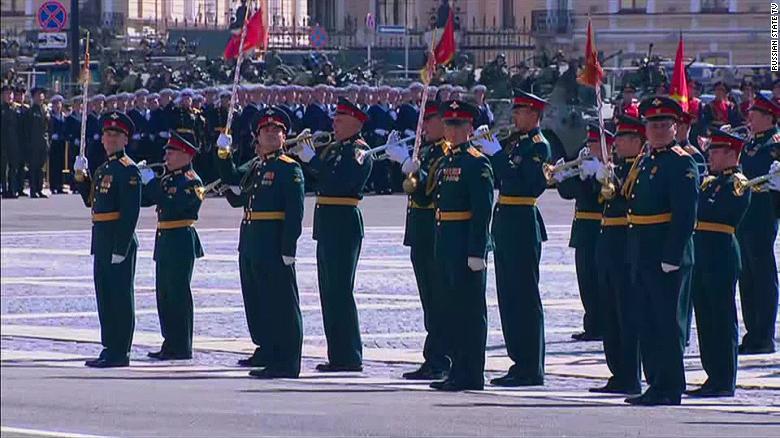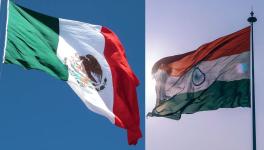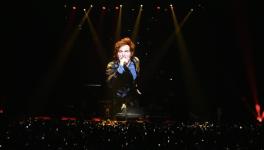Russia’s 75th Victory Day: A Brief Retelling

Defence Minister Rajnath Singh went to Moscow a few days ago to participate in the magnificent Victory Day Parade where Russia put on display her massive military might, 14,000 marchers and 64,000 participants. Fighter jets with Russian colours flew overhead. The parade was an impressive spectacle of Russia’s defence arsenal and defence personnel marching in precise unison. President Putin presided over the grand ceremony where eminent foreign state guests were present.
The parade is held on 9 May—the day that the Soviet Union triumphed over Nazi Germany in 1945. This year it was postponed to June due to the pandemic sweeping the world. Despite the pandemic thousands of participants and spectators wore no masks. One cheerful old veteran said, “We will defeat the virus as we defeated fascism.”
The Indian Defence Minister stated that he was proud to see the Tri -Service contingent of Indian Armed Forces at the Victory Day Parade in Moscow’s Red Square. He said it was “a proud and happy moment for me.” He also affirmed that the “traditional friendship between India and Russia remains strong” He went on to say that “the mutual interests are solid and we look to future cooperation in the spirit of our special friendship.”
Many Indians will be reassured by these declarations as the “traditional friendship” had waned since the 1990’s when Russia was in economic and political turmoil and India turned westwards, particularly to the USA. Globalization accentuated this trend. But after a decade Russia re-emerged as a formidable military power. India is now the largest importer of arms and defence equipment from Russia.
While the Defence Minister watched the Victory Day Parade, he may have mused on the heroic struggle and sacrifice that propelled Russia to victory.
As early as 1931, Nobel Laureate Rabindranath Tagore—aristocrat, poet, novelist, educationist - wrote in Letters from Russia—“Russian people must build their strength swiftly. They have many adversaries.” It is said that writers and artists see the future more clearly than politicians who are preoccupied with daily skirmishes. Exactly ten years later Rabindranath Tagore’s prediction actualised.
The Soviet Union did not want war; it was busy building her industrial base as well as developing crucial social sectors – health and education. War was thrust on her.
On 23 August 1939 the German foreign minister, Joachim von Ribbentrop arrived in Moscow to sign the German-Soviet Non-Aggression Pact with the Russian Foreign Minister Vyacheslav Molotov. It is a matter of conjecture whether Stalin—taciturn, devious, ruthless—and Hitler—voluble, full of sturm and drang, ruthless—tried to outwit the other.
The terms of the Pact on both sides was intended to buy time. Hitler wanted Stalin to remain neutral in the forthcoming war with Britain and France. He planned to invade Britain in “Operation Sea Lion”. After that France and Western Europe would be a cake walk—if Russia remained neutral. But by 1941 the fatal dream and consequent disasters of many would-be-conquerors of Russia also possessed Hitler.
Yosef Stalin had no illusions about German intentions. Like many of his Soviet comrades he resented the harsh terms of the Treaty of Brest-Litovsk inflicted on Russia by Germany in 1917 – once again on the pretext of buying time and peace. Preparing for invasion, the brilliant young Mikhail Tukachevsky, Commander of the Red Army advised Stalin to make massive investment in the armaments sector. He indicated the urgent need for 40,000 aircraft and 50,000 tanks. Defence expenditure increased from 12% to 18%.
But during Stalin’s Great Purge in the late 1930s, the officer corps of the Red Army was depleted and their replacements, appointed by Stalin for political reasons, lacked military competence and experience. Some thirty thousand Army personnel are estimated to have been executed. This was a devastating blow to the Red Army. Stalin struck a severe blow to the Red Army when he executed the young General Tukhachevsky who had led the Red Army to victory against the Anglo-American Army of Intervention in 1920.
Stalin anticipated Nazi invasion and ordered a frenetic increase in production of armaments. Between January 1939 and May 1941, new divisions were activated. There was rapid increase in creation of military units. Production of artillery, aircraft and armoured vehicles received top priority. Production of combat air-planes increased over 70 percent from the previous year. There was augmentation of weaponry for the Red Army coupled with massive conscription of men and increased motorised rifle divisions and tank divisions. The Soviet work-day was increased from seven to eight hours and then to every day of the week.
The Red Army declared “should war be forced on Soviet Russia, we will conduct the war offensively and carry it onto enemy territory." The conscripts were mainly peasants and workers who had little training in either combat or use of weapons. But as always in time of national peril, Russian soldiers brushed aside all thoughts of danger to defend their motherland.
In December 1940 Soviet Intelligence learnt through its excellent espionage system that Hitler had ordered his generals to defeat Soviet Russia in a swift and surprise invasion. Russian double agent Victor Sorge informed Stalin of the exact date of the attack. Stalin knew that invasion was imminent but decided not to escalate the mounting tension between the two nations in order to buy time to strengthen the Red Army. Unaware of this, Hitler was emboldened to invade a nation that no alien army had ever conquered.
Russia was invaded on 22nd June 1941 by the superbly armed formidable Nazi army. Germany called the invasion “Operation Barbarossa” after a German emperor who had led the First Crusade. Leningrad was in siege for nine hundred days. Three million of her inhabitants died from starvation. Despite the German army’s blandishments—food, fuel, security—Leningradians refused to surrender. In the freezing basement of the Hermitage Museum-Palace with a group of exhausted and starving musicians the Russian composer Dmitry Shostakovich conducted his “Leningrad Symphony” which was broadcast across the starving freezing city to inspire the people.
Operation Barbarossa failed to bring Russia to her knees. By 1942, Germany was fighting desperately in Europe, had been evicted from North Africa despite Field Marshal Rommel’s victories, had been drawn into war with USA and was running short of fuel, timber and food. They wanted access to the granaries of southern Russia, the timber of the dense forests and most importantly the resource rich Baku oilfields.
What lay in the path of the German Wehrmacht was a quiet town on the banks of the river Volga. A recent American film began with these words: “The fate of the world was being decided by a deadly battle on the banks of the Volga.”
The Battle of Stalingrad was the turning point in the Second World War. It was the most brutal battle of the Second World War and the bloodiest battle in the history of warfare. Russian victory in this bloodbath made her a super power and changed the history of the 20th century. The warfare began in September 1942. It continued through the terrible winter of 1942 to winter of 1943. It is no small irony that victory of the communist Red Army saved western capitalism and western democracy from the Nazi yoke. The West has forever downplayed Russia’s major role in defeating Nazi Germany. The Sixth Army of Germany under the command of General Friedrich von Paulus led the assault on Stalingrad. Hitler told his generals that conquest of the city bearing Stalin’s name would humiliate him and shatter the morale of the Soviet Union. Hitler had no doubts about German victory over a wounded Russia. What he did not realize that Russians were grimly determined not to lose Stalingrad and the Caucasian oilfields.
General Zhukhov was given command of Stalingrad. Stalin told him, “Remember, not a step backwards.” General von Paulus’ massive Sixth Army wreaked unimaginable havoc in two months. Not only did German soldiers kill Soviet soldiers but they killed non-combatants as well. The relentless artillery fire reduced the once prosperous town to a heap of rubble. After sustaining heavy losses of men and weapons Russians launched a fierce counter-offensive in November 1942. Marshal Zhukov surrounded the city with six million men. The regiment under Generals Romanenko and Chistykov attacked from the north. Joining them was General Chuikov. The 52nd, 57th, 64th and 65th armies attacked from the south.
Then the brilliant General Zhukov planned the counter-attack that defeated the German assault. He ordered his million soldiers to surround the city on all sides. The formidable German Sixth Army was trapped in snow-bound Stalingrad. General von Paulus pleaded with Hitler to retreat and save lives. Hitler refused even though German soldiers froze in the cold. Food, fuel and ammunition were running out. It was the siege of Leningrad in reverse; the besieged were now the Germans. On 31st January 1943 von Paulus surrendered the southern sector of Stalingrad. General Scherek surrendered the northern part.
The battle of Stalingrad was the beginning of the end of the Third Reich. General Zhukhov contributed significantly to Russian victory in Stalingrad; he masterminded the assault on Germany. He became the most decorated officer of the Soviet Army.
The losses sustained by both nations will never be known. The approximate estimate is loss of 750,000 men killed, missing or wounded from the German side while the Soviet army is estimated to have lost 478,741 men—killed or missing, while some 650,878 were wounded. The Russians took some 91,000 German soldiers and officers as prisoners of war. General von Paulus was taken a prisoner of war and was well treated. Civilian losses were immense.
But the war was not over. Soon after, the victorious Soviet Army began its unstoppable advance towards Berlin. General Zhukov gathered two and a half million troops; 6000 tanks and 40,000 artillery weapons were deployed for the final battle against Nazi Germany.
Though the German army was near collapse, it desperately resisted the formidable Red Army. On 15 April 1945, Soviet forces launched a powerful artillery attack on German forces and then sent a huge force against them. The advancing Red Army suffered heavier losses than the retreating Germans.
The battle for Berlin ended on 2 May 1945 when the hammer and sickle red flag was hoisted on the roof of German Reichstag.
Russian victory was dearly bought with the loss of millions of Russian lives, destruction of her cities and infrastructure. Never in history had a nation suffered so much and then risen out of the ashes to be a super-power.
It is this victory that Russia celebrates on 9 May every year. It was our victory as well because Soviet Union would play a significant role in the dismantling of colonial empires and liberation of subjected peoples.
Get the latest reports & analysis with people's perspective on Protests, movements & deep analytical videos, discussions of the current affairs in your Telegram app. Subscribe to NewsClick's Telegram channel & get Real-Time updates on stories, as they get published on our website.
























